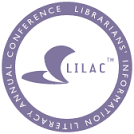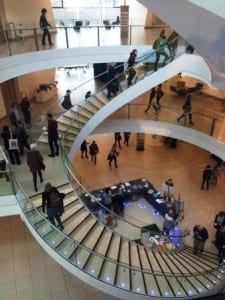The Gregynog Colloquium is the annual residential conference of WHELF (Wales Higher Education Libraries Forum) and HEWIT (Higher Education Wales Information Technology) where Welsh HE librarians and IT specialists gather to share knowledge and ideas and to hear about new initiatives from other institutions. Drawing around 188 colleagues annually from Welsh HE libraries, the Gregynog Colloquium is held in the stunning location of Gregynog Hall in Powys, a 750-acre estate and national nature reserve with a fascinating cultural history, including its own private press. Gregynog is being established as an independent charitable trust to safeguard the important academic and cultural heritage of Gregynog under a University of Wales initiative, with support from the Gwendoline and Margaret Davies Charity, the sisters who owned Gregynog in the 20th century and established its cultural initiatives. It is used throughout the year for residential courses for students of Welsh universities. I was invited to speak about the work of UCL Press, and about the general increase in new open access university presses being established within libraries, both in the UK and abroad.
The Hall was rebuilt in the 19th century by the Sudeley family who were pioneers in the use of concrete as a building material. The Sudeleys owned the Gregynog Estate at the time but their primary seat was in Toddington in Gloucestershire. The innovative use of concrete can be seen throughout the building. The banisters are a particular achievement: I must admit, I don’t normally pay particular attention banisters, but these are worth a mention. Rather than being a traditional wooden handrail, the banisters at Gregynog are actually a handrail shaped groove in the wall, molded out of concrete.
After several hundred years of private ownership, in 1913 a huge estate sale saw Gregynog’s farms, cottages and woodlands sold off, many to their tenants. Gregynog Hall might have been demolished had not the wealthy Davies sisters acquired it in 1920 to become the headquarters of their enterprise to bring art, music and creative skills to the people of Wales in the aftermath of the First World War. For twenty years the house was full of music, fine furniture and ceramics, hand-printed books from the Gregynog Press and, most extraordinary of all, the sisters’ collection of paintings by artists such as Monet, Cezanne and Van Gogh. Leading lights, such as George Bernard Shaw and Gustav Holst visited during these years for musical concerts – or simply to enjoy the beautiful gardens and woodland walks. At the end of the 1950s, after wartime use as a Red Cross convalescent home, Gregynog was bequeathed to the University of Wales as a conference centre. It welcomed its first students in 1963 and they’ve been coming ever since. The Gregynog Press, a private press founded by the sisters, printed the works of many rising stars in the world of illustration during its years of operation, and is still running to this day.
The Hall is still home to stunning artefacts and works of art. One of the original printing presses used by the Gregynog Press is on display in the Hall, as are works by many of the most famous artists who contributed works to the Press in its heyday in the 1920s and 1930s – Agnes Miller Parker, Blair Hughes-Stanton, David Jones and Gertrude Hermes. The Davies sisters’ works of art are on display in their drawing room where the drinks reception was held during the conference. It is a place that feels slightly lost in time, where an Agatha Christie murder mystery would not be out of place. The Davies sisters’ library is still in situ, and contains a collection of books that anyone interested in the arts and humanities would be proud to own – not necessarily because of the rarity of the books in the collection but because of the breadth: classic works of fiction, monographs on significant artists, and works of philosophy, history and classics fill two large rooms and the corridors.
I was only there for the first day of the conference itself, which started with a keynote speech by Chris Banks, Director of Library Services at Imperial College London, who spoke inspiringly about the academic library of the future. This was followed by presentations by Steve Williams of Swansea University, and Paul Jeorett of Wrexham Glyndwr University, the latter talking about the rise and fall of international students from different parts of the world, and the potential of the outcome of the Brexit referendum to change the international student cohort figures significantly (it is hard now to remember a time when Brexit seemed just a remote possibility). He highlighted the important work librarians do to help international students.
I was sorry I couldn’t stay at Gregynog longer. The impressive surroundings and significant cultural associations, the fascinating history, the stunning location, and the association with a long-running private press, made this a memorable occasion. I enjoyed meeting the conference attendees and the staff at Gregynog, who were knowledgeable and passionate about Gregynog and its history.
What was most abundant and welcome, although slightly difficult to get used to, was the silence: there were no sirens, no traffic, there were no TVs in the rooms and no lifts, all the noises one usually hears in a typical urban hotel. All I could hear as the sun rose were the birds and the sheep.
Posted on behalf of Lara Speicher, Publishing Manager, UCL Press
 Close
Close







